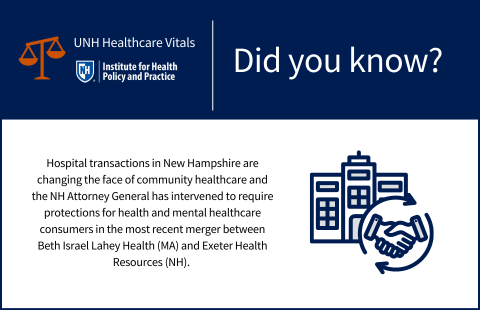UNH Healthcare Vitals: Hospital Transactions in New Hampshire
Did you know?

The New Hampshire Attorney General has secured enhanced protections for health and mental healthcare consumers as hospital transactions continue across New Hampshire. In June, a judge approved the Attorney General’s proposed judgement requiring Beth Israel Lahey Health, a nonprofit integrated health system with facilities located across Eastern Massachusetts (“BILH”), to invest in mental health services, primary care access and consumer protections in exchange for the permission required to finalize its proposed affiliation with Exeter Health Resources (“Exeter”), a NH non-profit community healthcare provider.
Here is the latest:
Hospitals and health care entities have been consolidating in record numbers in New Hampshire over the past 10 years, particularly in the Southern and Seacoast areas, changing the face of healthcare for NH communities. Out-of-state systems have been particularly interested in New Hampshire where there is little oversight of healthcare pricing, services or facility construction. In 2020, for-profit HCA Healthcare, (Nashville TN) acquired its third not-for-profit hospital, Frisbie Memorial Hospital (Rochester). In 2017, not-for-profit giant Mass General Brigham acquired Wentworth-Douglass Hospital (Dover) and in 2022 established a major ambulatory care site in Salem.
The New Hampshire Attorney General reviews certain healthcare transactions as part of its duties to supervise charitable trusts and protect against unfair business practices that hurt consumers. The Attorney General reviewed the proposed transaction between BILH and Exeter and found it violates NH consumer protection law because it would unfairly raise healthcare costs, premiums, co-pays and deductibles, as well as diminish health insurance coverage and limit competition. The Attorney General also voiced concern about the need for labor and delivery services in New Hampshire.
To move forward with the transaction in the face of these potential impacts, BILH and Exeter reached a final agreement with the AG filed in Merrimack County Superior Court on June 14, 2023, committing to investments in affordable and equitable healthcare services, like mental health, primary care, and maternity care. The Court Merrimack County Superior Court Judge Amy Ignatius approved the agreement on June 30, 2023.
BILH and Exeter are now required to:
- make a capital commitment of $375m in Exeter, including new resources for community identified needs;
- open 10 Designated Receiving Facility beds for people in mental health crisis;
- maintain labor and delivery services;
- invest $10 million to protect healthcare consumers through the new legislatively created Health Care Consumer Protection Trust Fund (see HB2, 79:490, RSA 7:6-g and h) administered by the Attorney General and advised by the new Health Care Consumer Advisory Commission;
- prohibit certain anti-competitive agreements with health plans and providers;
- prohibit billing practices that raise prices and limit access;
- enhance chronically underfunded services such as primary care, mental health, substance use, and elder care; and,
- maintain certain good governance and charity care policies.
BILH and Exeter have also agreed to cooperate fully with and pay for an Independent Compliance Monitor to ensure the above obligations are fulfilled.
What does this mean for New Hampshire?
New Hampshire patients have seen significant changes in affordability and access to healthcare services in New Hampshire resulting from numerous transactions and shifts in the delivery of services. The agreement between BILH-Exeter and the Attorney General, including the parameters that establish the Independent Monitor, the Health Care Consumer Protection Trust Fund, and the Advisory Commission, provides an opportunity for New Hampshire patients to experience transparency and more active participation in healthcare acquisition transactions.
The Attorney General has taken important steps by requiring conditions on this transaction. The agreement points to the ongoing need for oversight, accountability, and enforcement in healthcare matters precisely because they are critical to ensuring New Hampshire patients have a sustainable and equitable healthcare system.
